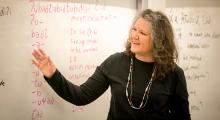Voices from the past filter into Tami Hohn’s classroom as her students listen to oral recordings in Southern Lushootseed. Punctuated by cracks and hisses, the aging audio brings to life the words of first-language speakers captured decades ago — when there were many more of them.
The sounds and stories preserved in those recordings are connecting across time with a new generation of speakers at the University. Guided by Hohn, students learn to follow a trail of linguistic clues to unlock the indigenous language of the Puget Sound.
In 2019, thanks to Hohn’s work and the Department of American Indian Studies, Southern Lushootseed officially joined the more than 60 world languages already taught at the UW. The full-year course, which is on its way to becoming a permanent part of the curriculum, gives students the ability to excavate the language from the writings, recordings, cultural practices and land where it’s been preserved.
Southern Lushootseed permeates the land around the University of Washington, from the texts and archives held at campus libraries to the names of geographical features like the Duwamish River and the Kitsap Peninsula.
“There’s a language held in this University,” says Hohn, a UW lecturer and Puyallup tribal member who has dedicated much of her life to sharing the language. “If I can teach people how to find it and use it, it will spread everywhere.”
More from the article below:
